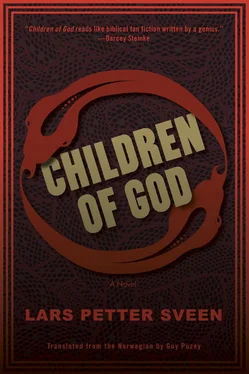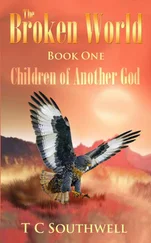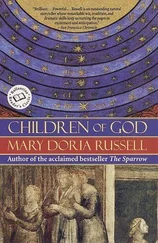Night falls, darkness envelops them. Peter walks between the trees, his hands brushing past the trunks, and after a while he stops. He hears somebody following him. He sits down in the dark. The fingers crawl up his chest, stopping at his collarbone.
“Not now,” says Peter. “I don’t have any stories for you now.”
“Simon,” a voice says from behind him.
“I’m here,” says Peter. “Did I wake you?” Andrew’s breath comes to him, a warm smell reminding him of when they slept together, side by side, as children.
“I was awake,” says Andrew. “I was waiting.”
Peter hears Andrew sit down. He raises his head, trying to see the sky between the tops of the trees.
“I heard you telling the stories about Father,” says Andrew.
“I want to be alone,” Peter tells him.
“You know, I can’t remember Father anymore,” says Andrew. “I can only remember what he looked like when we found him.”
Peter gets up; he tries to walk to where he thinks Andrew’s sitting, fumbling his way through the dark.
“Philip told me about two of his uncles and an aunt who were taken,” says Andrew. “Mary’s father was taken too, while he was looking for his neighbor. There are even more, there are so many who’ve been affected. We’re not the only ones.”
Peter walks through the darkness, waving his arms in front of him, hitting some twigs. “Be quiet,” he says. “Go away, I don’t want to hear these stories.”
When he stops, Andrew’s behind him, still talking: “You’re not sleeping anymore, Simon, you look tired. I beg you, please put Father behind you and everything you remember about him.”
Peter shakes his head, but they’re in the dark, and Andrew can’t see anything.
“Listen to me,” says Andrew. “You need some rest, we need you, we’re together, there are many of us, we’re not the only ones here.”
“We’re not the only ones,” says Peter, “but we’re almost alone.”
“We’re never alone,” says Andrew. “We’re together, we always have been. We’ll never give up, we’ll never disappear.”
“Leave me in peace,” says Peter.
“It’s no use, Simon,” says Andrew. “You have to let go of Father, you have to let go of everything that happened.”
When Andrew goes, Peter feels something move next to his feet. He bends down, catches it, and picks it up. It has several legs, it’s hard, it’s small, it seems fragile and unbreakable at the same time. He holds it up to his ear, and a faint sound comes from it. Is it the mouth or all the moving parts that are speaking to him? Is it a special language coming from inside the creature, or is it the faint clattering of its legs? Peter lets it go, and it vanishes at once. His fingers are warm, and he locks them together.
“Our Father in heaven,” he whispers. “Your kingdom come, your will be done, on earth as it is in heaven.” His fingers let go of each other and come up toward his face. They wrap around his neck, pressing warmly against his beard, against his skin and the pulse beneath.
“There was a man,” Peter whispers, “whom nobody could understand when he spoke. The words he said were clear and plain, but when they came out, they were so delicate that they snapped. He worked with his hands, first as a fisherman, then as a builder. One day, he decided to sell the food he grew, and he went to the markets in the area. People bought what he sold, he waved his hands and made faces to show how good his wares were and how much they cost. One day, there was a person who’d stolen money from a merchant, and the guards in the marketplace suspected the man whom nobody could understand when he spoke. The guards tried to talk with him, but the words that came out were incomprehensible to them. They told him to speak clearly, but he went on the same way, so they held him still while they looked for the stolen money. The man began to shout, and people crowded around. The guards were now holding him so hard around the throat that something was crushed inside. They couldn’t find the stolen money, and they let the man go, but now the man could no longer make a sound when he opened his mouth. His throat grated every time he swallowed, and the skin around it took on a dark yellow color. He went home to his house, and over the following days, everything he’d grown rotted. He left his house and went up into the mountains, where he met people who pretended to hear the words that wouldn’t come out of him. They fed him, they armed him, and he joined them to fight against the occupying powers. When they were all cut down, one by one, the man whom nobody could understand when he spoke was left standing alone against the military power of their enemies. He dropped his weapons and opened his mouth, but nothing came out. The soldiers approached the man, and he knew what they’d do if he couldn’t say the right words to them. So he picked up his weapons again and ran toward them.
“The children found all the bodies later. The man lay at the bottom of the heap, and when his mouth suddenly opened, words ran out that only those children could understand.
“Just one story,” says Peter, with fingers in front of his mouth. “There’s nothing else in there.” The fingers descend, wrapping themselves around his neck again. Peter sits there on the ground. Eventually the fingers lose their grip, and he falls asleep against a tree.
He wakes up later in the same darkness and starts to crawl around on the ground, before sitting down to wait. When the first light comes, he tries to find his way back to the others again.
They wander about along the river Jordan, and one night, Peter falls asleep and dreams about singing fish, and about himself and his brother sailing in a boat across the water. They carry on through Judea until they eventually end up in mighty Jerusalem.
Judas has become thinner, his hair hanging down in front of his face, but he smiles when Peter talks to him.
Peter lies down next to Andrew every evening and stays there, lying awake throughout the night. He can hear Andrew lying awake too, falling asleep only in the early hours of the morning.
They spread out. Some fetch food, others gather information about the soldiers and the guards and the schedules at the Temple. Peter stays resting with Jesus. He tries to sleep, but his head is gently throbbing, and he tries to drink the water. Eventually, he falls asleep and dreams of birds talking and dogs wandering around a dead forest. When he wakes up, he’s thirsty.
When evening comes, they gather together to eat. They don’t invite any strangers to eat with them. They’re cautious now, as they don’t want to attract any attention. The city is under a strict watch, with soldiers and guards everywhere. While they eat, they talk quietly about what they’ve seen in Jerusalem, who they’ve met. Some of them who’ve been inside the Temple say that it’s filled with merchants and Roman decorations. The chatter gradually picks up, with several people speaking at the same time. Some people sit on the floor, dipping pieces of bread in olive oil and sprinkling salt on top. A boy begins to hum a lullaby softly, and two women sing along with him. Andrew leans back next to Peter and puts his arm behind his big brother’s shoulders. Peter closes his eyes and pictures Andrew and himself on the beach, the water like a cold blanket around their ankles. Shells on their nails, on their skin, as if they’d come back from a magical world and these were the remains of a shining skin they’d now stripped off.
When he opens his eyes, he sees Thomas and John sitting on one side of Jesus, with Mary sitting on the other side. They all appear to be speaking at the same time, while Jesus sits there quietly, staring at Peter. Peter stares back. Thomas, John, and Mary are talking, but Jesus is sitting peacefully between them, and he’s looking at Peter. Then Peter can feel something moving. He looks down in his lap, and it’s his fingers. They lift up, one by one, first on one hand, and then on the other. Peter looks up at Jesus, and Jesus is still staring at him. Jesus opens his mouth, says something, and Thomas and John stop talking, Mary stops talking.
Читать дальше











